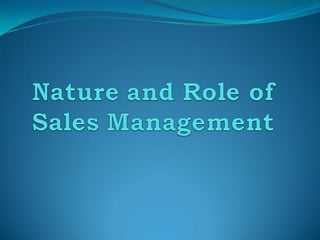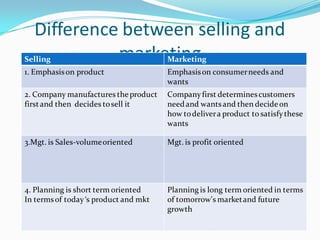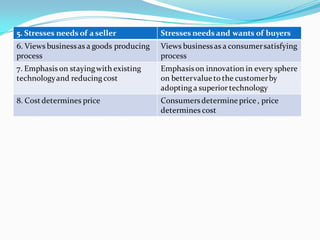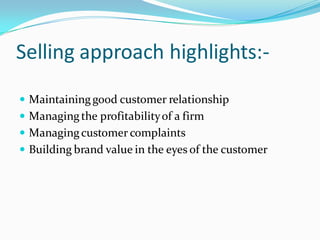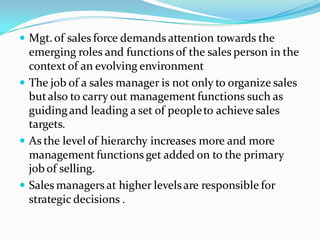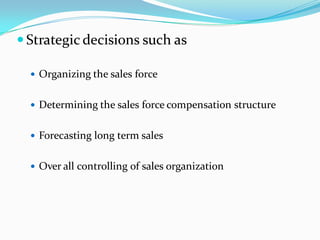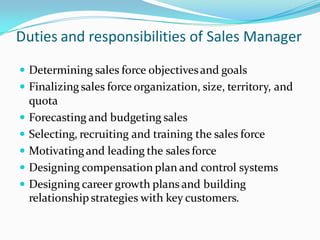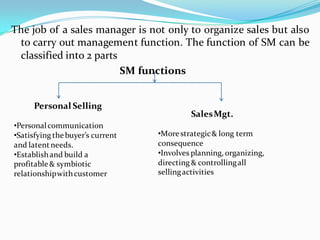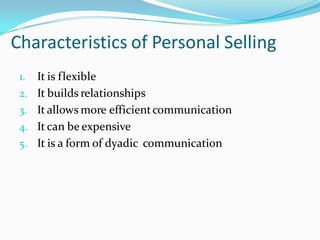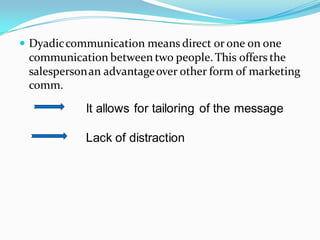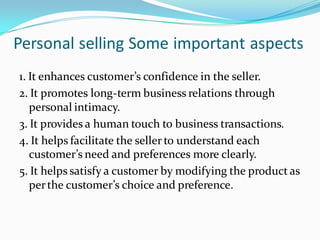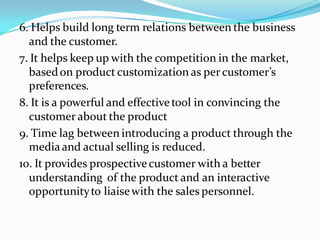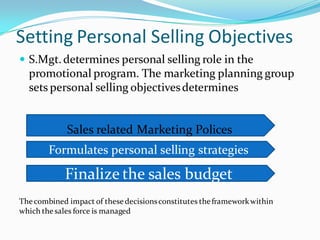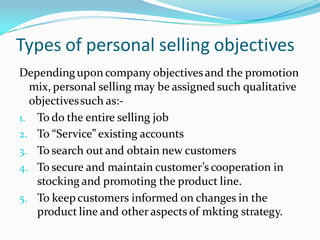Personal Selling
- 2. Difference between selling and marketing Selling Marketing 1. Emphasis on product Emphasis on consumer needs and wants 2. Company manufactures the product Company first determines customers first and then decides to sell it need and wants and then decide on how to deliver a product to satisfy these wants 3.Mgt. is Sales-volume oriented Mgt. is profit oriented 4. Planning is short term oriented Planning is long term oriented in terms In terms of today ‘s product and mkt of tomorrow's market and future growth
- 3. 5. Stresses needs of a seller Stresses needs and wants of buyers 6. Views business as a goods producing Views business as a consumer satisfying process process 7. Emphasis on staying with existing Emphasis on innovation in every sphere technology and reducing cost on better value to the customer by adopting a superior technology 8. Cost determines price Consumers determine price , price determines cost
- 4. The basic function and role of selling Generate sales Earn revenue S.Mgt is more strategic and of long term as it involves Planning Organising Directing Controlling of all the selling activities of organization
- 5. Selling approach highlights:- Maintaining good customer relationship Managing the profitability of a firm Managing customer complaints Building brand value in the eyes of the customer
- 6. Mgt. of sales force demands attention towards the emerging roles and functions of the sales person in the context of an evolving environment The job of a sales manager is not only to organize sales but also to carry out management functions such as guiding and leading a set of people to achieve sales targets. As the level of hierarchy increases more and more management functions get added on to the primary job of selling. Sales managers at higher levels are responsible for strategic decisions .
- 7. Strategic decisions such as Organizing the sales force Determining the sales force compensation structure Forecasting long term sales Over all controlling of sales organization
- 8. The role of sales manager in an organization has become strategic. He is looked at as combination of An accountant Planner Personal Manager Marketer
- 9. Duties and responsibilities of Sales Manager Determining sales force objectives and goals Finalizing sales force organization, size, territory, and quota Forecasting and budgeting sales Selecting, recruiting and training the sales force Motivating and leading the sales force Designing compensation plan and control systems Designing career growth plans and building relationship strategies with key customers.
- 10. The job of a sales manager is not only to organize sales but also to carry out management function. The function of SM can be classified into 2 parts SM functions Personal Selling Sales Mgt. •Personal communication •More strategic & long term •Satisfying the buyer’s current consequence and latent needs. •Involves planning, organizing, •Establish and build a directing & controlling all profitable & symbiotic selling activities relationship with customer
- 11. Personal Selling Personal Selling can be defined as the process of person to person communication between a salesperson and a prospective customer in which the former learns about the latter’s needs and seeks to satisfy those needs by offering the prospective customer the opportunity to buy something of value, such as goods or a service.
- 12. Characteristics of Personal Selling It is flexible 1. It builds relationships 2. It allows more efficient communication 3. It can be expensive 4. It is a form of dyadic communication 5.
- 13. Dyadic communication means direct or one on one communication between two people. This offers the salesperson an advantage over other form of marketing comm. It allows for tailoring of the message Lack of distraction
- 14. Personal selling Some important aspects 1. It enhances customer’s confidence in the seller. 2. It promotes long-term business relations through personal intimacy. 3. It provides a human touch to business transactions. 4. It helps facilitate the seller to understand each customer’s need and preferences more clearly. 5. It helps satisfy a customer by modifying the product as per the customer’s choice and preference.
- 15. 6. Helps build long term relations between the business and the customer. 7. It helps keep up with the competition in the market, based on product customization as per customer’s preferences. 8. It is a powerful and effective tool in convincing the customer about the product 9. Time lag between introducing a product through the media and actual selling is reduced. 10. It provides prospective customer with a better understanding of the product and an interactive opportunity to liaise with the sales personnel.
- 16. Setting Personal Selling Objectives S.Mgt. determines personal selling role in the promotional program. The marketing planning group sets personal selling objectives determines Sales related Marketing Polices Formulates personal selling strategies Finalize the sales budget The combined impact of these decisions constitutes the framework within which the sales force is managed
- 17. Types of personal selling objectives Depending upon company objectives and the promotion mix, personal selling may be assigned such qualitative objectives such as:- 1. To do the entire selling job 2. To “Service” existing accounts 3. To search out and obtain new customers 4. To secure and maintain customer’s cooperation in stocking and promoting the product line. 5. To keep customers informed on changes in the product line and other aspects of mkting strategy.
- 18. 6. To assist customers in selling the product line. 7. To provide technical advice and assistance to customers. 8. To assist with the training of middlemen’s sales personnel . 9. To provide advice and assistance to middlemen on management problems. 10. To collect and report market information of interest and use to company mgt.
